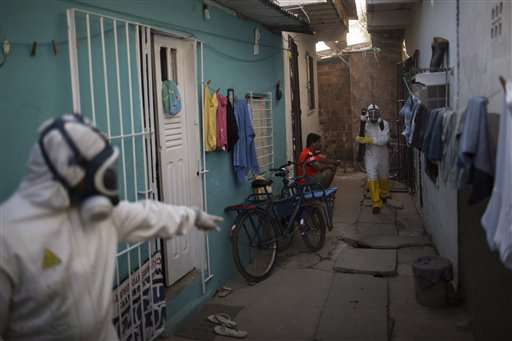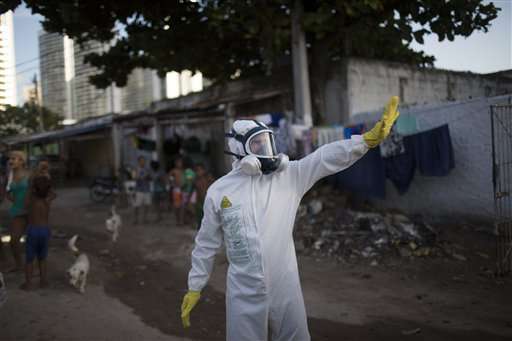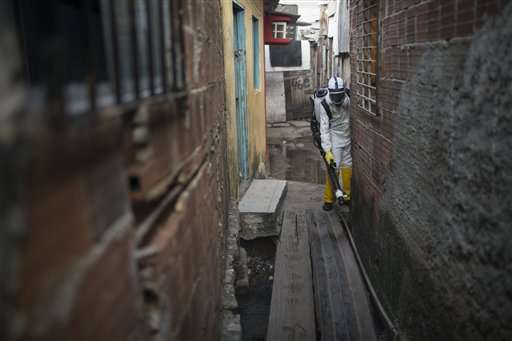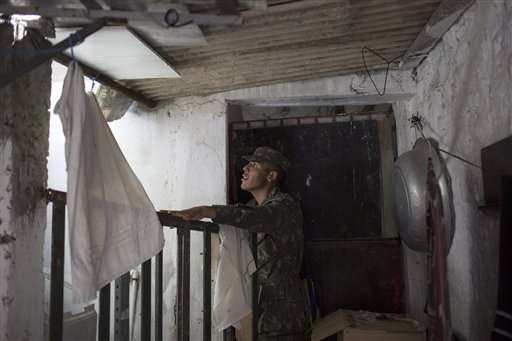Municipal workers sprays insecticide to combat the Aedes aegypti mosquitoes that transmits the Zika virus at the Imbiribeira neighborhood in Recife, Pernambuco state, Brazil, Tuesday, Jan. 26, 2016. Brazil's health minister Marcelo Castro said that nearly 220,000 members of Brazil's Armed Forces would go door-to-door to help in mosquito eradication efforts ahead of the country's Carnival celebrations. (AP Photo/Felipe Dana)
New figures released Wednesday by Brazil's Health Ministry as part of a probe into the Zika virus have found fewer confirmed cases of a rare brain defect than first feared.
So far, only 270 of 4,180 suspected cases have been confirmed as microcephaly, with the brain damage associated with the defect ruled out in 462 cases. Researchers are still studying 3,448 of the cases, which were recorded from Oct. 22
Brazilian officials still say they believe there's a sharp increase in cases of microcephaly and strongly suspect the Zika virus, which appeared in the country last year, is to blame. The concern is strong enough that the U.S. Centers for Disease Control and Prevention has warned pregnant women to reconsider visits to areas where Zika is present.
The rare birth defect, which also can be caused by factors such as infections, malnutrition or drugs, means babies have unusually small heads, 32 centimeters (12.6 inches) or less in circumference, and it can cause lasting developmental problems.
The cases reported to the Health Ministry include delivered infants, stillborn and miscarried babies, and fetuses shown to have unusually small heads by ultrasound or other diagnostic tests, the ministry said. It then tests to see if neurological imaging shows the brain has been affected.
Municipal workers pause to refill the insecticide sprayer during an operation to combat the Aedes aegypti mosquitoes that transmits the Zika virus at the Imbiribeira neighborhood in Recife, Pernambuco state, Brazil, Tuesday, Jan. 26, 2016. Brazil's health minister Marcelo Castro said that nearly 220,000 members of Brazil's Armed Forces would go door-to-door to help in mosquito eradication efforts ahead of the country's Carnival celebrations. (AP Photo/Felipe Dana)
Officials said babies found to be microcephalic and their mothers are given additional tests to see if they had the Zika virus—often a difficult process. Six of the 270 confirmed microcephaly cases were found to have the virus. Two were stillborn and four were live births, three of whom later died, the ministry said.
Brazilian health officials estimate they had 150 cases of microcephaly in all of 2014.
The Health Ministry said Brazilian states were not required to report microcephaly cases before November. That could mean the 2014 list didn't fully account for all cases, though the ministry dismissed the idea there might have been a large number of unreported cases.
A municipal worker gestures during an operation to combat the Aedes aegypti mosquitoes that transmits the Zika virus in Recife, Pernambuco state, Brazil, Tuesday, Jan. 26, 2016. Brazil's health minister Marcelo Castro says the country is sending some 220,000 troops to battle the mosquito blamed for spreading a virus suspected of causing birth defects, but he also says the war is already being lost. (AP Photo/Felipe Dana)
The U.S. CDC says about the rate of microcephaly in the U.S. is about 2 to 12 per 10,000 live births—a figure far higher than Brazil's estimates for earlier years.
On Tuesday, Brazil's health minister, Marcelo Castro, announced that 220,000 military personnel were being deployed to bolster efforts to eradicate the Aedes aegypti mosquito that transmits Zika, dengue, chikungunya and yellow fever.
Castro said the government also would distribute mosquito repellent to some 400,000 pregnant women who receive cash-transfer benefits.
A municipal worker sprays insecticide to combat the Aedes aegypti mosquitoes that transmits the Zika virus at the Imbiribeira neighborhood in Recife, Pernambuco state, Brazil, Tuesday, Jan. 26, 2016. Brazil's health minister Marcelo Castro said that nearly 220,000 members of Brazil's Armed Forces would go door-to-door to help in mosquito eradication efforts ahead of the country's Carnival celebrations. (AP Photo/Felipe Dana)
The arrival of Zika in Brazil last year initially caused little alarm as the virus' symptoms are generally much milder than those of dengue. Then late last year, Brazilian researchers reported they suspected Zika was linked to the dramatic increase in reported cases of microcephaly.
The World Health Organization has stressed that a link remains circumstantial and is not yet proven scientifically.
The CDC is advising pregnant women to reconsider travel to Brazil and 21 other countries and territories with Zika outbreaks. Officials in El Salvador, Colombia and Brazil have suggested women stop getting pregnant until the crisis has passed.
A Brazilian Army soldier inspects a house during an operation to combat the Aedes aegypti mosquitoes that transmits the Zika virus in Recife, Pernambuco state, Brazil, Tuesday, Jan. 26, 2016. Brazil's health minister Marcelo Castro said that nearly 220,000 members of Brazil's Armed Forces would go door-to-door to help in mosquito eradication efforts ahead of the country's Carnival celebrations. (AP Photo/Felipe Dana)
© 2016 The Associated Press. All rights reserved.
























